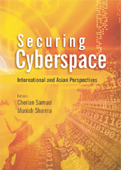Securing Cyberspace: International and Asian Perspectives
- Publisher: Pentagon Press
This edited volume contains the papers presented at the 18th Asian Security Conference at the Institute for Defence Studies and Analyses held in February 2016. The authors, drawn from government, law enforcement, diplomacy, private sector, armed forces and academia, examine a range of issues central to cybersecurity. The chapters in this volume not only provide an outline of the journey so far, but more importantly, give indicators of future trends in cybersecurity from the vantage point of the respective experts.
Contributions from Asia are particularly highlighted to promote and provoke greater discussion on perspective from within the region on cybersecurity issues.
- ISBN 978-81-8274-918-4,
- Price: ₹ 1295
- E-copy available
- Cherian Samuel, Munish Sharma |
- 2016 |








